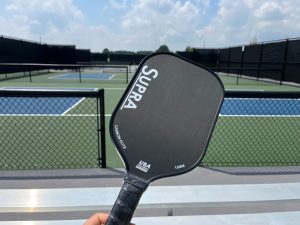Niche recreational sports often capture the national zeitgeist that transcend demographics, geographies, and athletic abilities. In the 2000s, Ultimate Frisbee was the recreational sport du jour. Disc or “Frisbee” Golf (a.k.a. “Frolf”) also had its moment. And in the mid 2010s, Spikeball gained mass popularity as a fun, accessible, and admittedly wacky form of American recreation.
Today’s latest craze? Pickleball — a fast-paced paddle sport that combines elements of tennis, table tennis, and badminton. Traditionally popular among older adults, younger players have increasingly turned to the sport over the past decade. Indeed, Google Analytics shows that over the past five years interest has exploded ten-fold. In 2010, the USA Pickleball Association (USAPA) had just over 4,000 members, growing to 50,000 as of June 2021.
And despite the sport’s energetic enthusiasts, pickleball has sparked controversy from coast to coast in our public discourse. Enter the world of pickleball politics.
Battles abound amid “The Pickleball Wars”
Across the US, municipalities have converted tennis courts into pickleball courts or built them anew to meet increasing constituent demand. Today, there are currently over 10,000 pickleball courts in the US. But city officials will be quick to tell you that pickleball’s popularity is anything but universal. Many cities have seen residents vociferously oppose the construction and maintenance of pickleball courts. Why? Unlike its net- and paddle-bearing cousins, the “smack” of a pickleball can be particularly irksome to neighboring residents, with noise reaching up to 70-80 decibels (tennis gameplay typically lands between 50-60 decibels).

Pickleball has been the source of dozens of lawsuits, acrimony between neighbors, and hours of debate between enthusiasts and detractors alike. In Goleta, California, for example, hundreds of residents attended a multi-hour public meeting to determine the fate of a tennis court slated to be converted into pickleball courts. While many supported the construction, others were opposed. “We hear the ball hit the paddle from inside our homes all day long, 8 a.m. to 8:30 p.m.,” according to a resident of Goleta. “I want to stress that it’s all day, nonstop.”
These complaints — surely understandable to most of us — are not unique to pickleball. Those living close to highways, airports, and other noise-producing public spaces have long lobbied authorities to pursue noise abatement solutions. However, pickleball might be especially prone to hyperbole. One resident — a Vietnam War veteran — compared it to the mortar shelling, for example, he experienced during war time. Activists in Arlington, Virginia went as far to accuse pickleball players of bullying children and of public urination. The battle between pickleball players and neighboring residents is so resonant that a new play recently debuted in Massachusetts dubbed “The Pickleball Wars.”
Achieving a detente in the pickleball wars
Pickleball is one of many issues that governments grapple with publicly (e.g., hearings) and privately (e.g., individual lobbying). By collecting data points from their constituents, governments must assess the volume, intensity, and impact of action. In this way, their decisions aim to balance the often competing needs of constituents. In the case of pickleball, this includes listening, understanding, and acting on the needs of both pickleball players and neighboring residents.
Our country’s social contract is that our representatives will govern responsively to the needs of the people that elected them. Doing so requires active engagement through various “listening” forums. The ultimate way to “hear” your constituents is at the ballot box. However, if elections were the only source of data for satisfaction with public services, the government would be limited to infrequent and shallow sources of insight. In today’s hyperconnected world, policymakers need rapid and deep signals to separate the signal from the noise in ways that effectively balance the different needs of constituents.
As highlighted earlier, public forums are a meaningful way for constituents to engage their government. For pickleball antagonists, hearings are the primary means of communicating needs and preferences to policymakers and administrators.
Public forums, however, are rarely sufficient to assess how constituents truly feel about an issue. Why? Relying solely on public forums typically means only the most ardent supporters or detractors of issues are represented, often drowning out the “silent majority” of residents. Equally important, they are only accessible to people with the resources (e.g., time, gas money, child care) to attend often lengthy hearings. As a result, the voices of an unrepresentative few can catalyze government policies that do not reflect the true needs of the citizenry.
Often these two things overlap. The voice of the majority is reflected in the literal voice of those that attend public hearings. In the case of pickleball, however, lopsided arguments can be made because the costs imposed are large and concentrated (10s of residents impacted by pickleball noise pollution) and the benefits are more diffuse (1000s of residents who enjoy pickleball on occasion).
The solution? Listen. Understand. Act.
Many municipalities have cracked the code. The St. Petersburg, Florida City Council decided to place the courts at the most remote area of a park. Santa Cruz, California invested in sound-dampening fencing to address resident concerns. And St. George, Utah considered noise monitors and designated specific hours for play. Here, leaders marshaled the political will for compromise by deepening their engagement with the broader citizenry. Doing so overcomes the “noise” of vocal minorities to include the “signal” of all residents.
Beyond pickleball, governments are increasingly working to understand and improve constituent experience through the aforementioned “Listen. Understand. Act.” framework. First, high performing governments invest in lightweight, but still sophisticated listening tools to capture input through multiple channels and among multiple subpopulations. Second, they seek to understand the engagement data they’ve collected through discussion and analysis. Finally, they act to further the public good — not based on anecdote alone, but also on data representative of all community views.
Pickleball has animated our national spirit — both on and off the court. It has also animated our political spirit — and highlighted the continued need for engaged and data-driven government.
Crosby Burns is a Principal on Qualtrics’ Government Strategy and Value Advisory Teams, helping governments build trust and deliver faster, reliable, relevant services to residents through human-centered design and evidence-based research.





Leave a Reply
You must be logged in to post a comment.